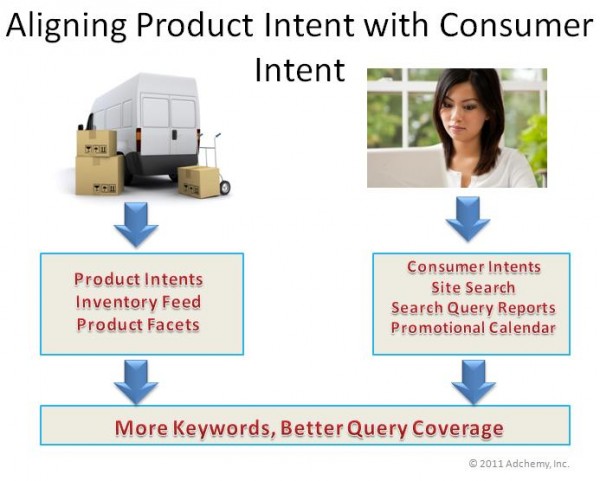Keyword Expansion Resources & Strategies For Retailers
Many retailers already own the data they need to profitably expand their paid search campaigns: it exists within their site search logs, website analytics, inventory feeds and in external consumer intents found through search queries. The challenge retailers face is how to engineer a broader keyword portfolio that widens their reach in the query space […]
Many retailers already own the data they need to profitably expand their paid search campaigns: it exists within their site search logs, website analytics, inventory feeds and in external consumer intents found through search queries.
The challenge retailers face is how to engineer a broader keyword portfolio that widens their reach in the query space and deliver relevant products to satisfy consumer demand.
In this post, we’ll discuss several keyword expansion resources already available internally to many retailers and the ways to best organize expansion techniques to ensure optimal performance.
Identify Product Intent Through Inventory Feed
Perhaps the most valuable resource for retailers seeking profitable keyword expansion is within their product catalog, or inventory feed. For retailers, inventory feeds consist of an entire database of products available for sale within a given inventory. These products frequently contain specific facets appealing to consumers.
For our purposes, facets are defined as aspects or features of each individual product (brands, sizes, colors, materials, styles etc). The combination of products and their corresponding facets is defined as product intent.
Each time consumers execute a search on a search engine, they are asking a question. Some questions, or queries, do not reveal much specificity about the product intent, in cases where product intent is in the query.
For example, consumer A queries the search engine for “dresses”; Consumer B, on the other hand, queries the search engine for “black dress size 4”. In the first example, the consumer did not include any specific features of the product they were searching for. Conversely, the second consumer is very specific about the color and size of product they desire.
There is an abundance of information found within the facets of your inventory feed that can help retailers build a more robust exact match keyword portfolio. By combining every possible searchable combination of facets that relate to products in your inventory, retailers can specifically market products at a much more granular level.
Consumer Intent
In addition to resourcing product feed for product intent, retailers need to evaluate the consumer behavior to identify what are the common features relevant to the products being searched for, or consumer intent.
While sometimes consumer intent can be found within inventory feeds (as in the previous example of size, color, material), often intent exists outside of what retailers define as product features.
Some examples here may include “sassy dress”, “sexy dress” or even “holiday dress”. These examples illustrate either emotion (sassy or sexy) or occasion (holiday). Site search logs contain very valuable information for advertisers — exactly what product consumers are searching for while visiting your website.
Advertisers can develop an arsenal of exact match templates based on analysis of their site search logs. Google AdWords and adCenter search query reports also provide a wealth of information surrounding consumer intent. Using search query reports from the search engines enables retailers to identify new consumer intents and weed out poor performing or irrelevant intents by adding negative keywords.
Promotional calendars can be also leveraged to expand upon additional exact match keywords.
For example, many mattress outlets offer sales during Memorial Day for consumers who want to throw out their old mattress and purchase a new one. For mattress retailers, knowing your promotional calendar ahead of time can help to create keywords surrounding the specific holiday and place these keywords into their own ad group with ad copy specifically targeting promotions.
Poor Structure Leads To Poor Performance
Poor account architecture can impede a retailers ability to create quality ad copy post keyword expansion efforts. Historically, incrementally adding keywords without structure can adversely impact an account’s quality score and performance.
As retailers obtain new product lines or discontinue old products, they need to ensure they are keeping their account architecture as clean and tight as possible.
Adding new keywords from the new product line into the same ad groups as existing keywords with a different product line will clutter up the ad groups and leave room for a poor and irrelevant structure. Adding keywords without structure leads to a high number of keywords in ad groups which can also impact the relevancy of the ad served to the consumer.
Also, retailers should avoid adding products from different categories to the same ad groups and/or campaigns. By having tightly themed ad groups within campaigns, retailers can target the specific facets of each product within their inventory feed.
Retailers that are able to expand their portfolios by aligning the consumer intent found in the query logs and the product intent found within their inventory feed, will end up with more keywords that are significantly better targeted than those retailers who do not maintain this alignment.
By tightening the reins on the ad group structure and producing ad groups with a small number of keywords, retailers can develop more targeted ad copy based specifically on the alignment of consumer and product intent.
Contributing authors are invited to create content for Search Engine Land and are chosen for their expertise and contribution to the search community. Our contributors work under the oversight of the editorial staff and contributions are checked for quality and relevance to our readers. The opinions they express are their own.
Related stories
New on Search Engine Land
